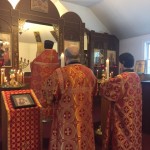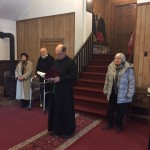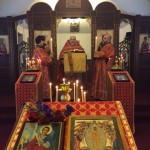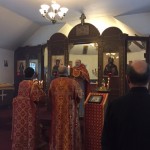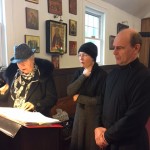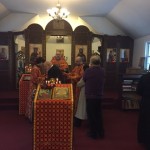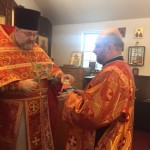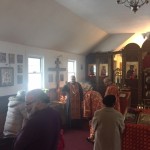On December 17, on the 28th Sunday after Pentecost, we had a beautiful celebration at St. George Church. On that day the Church commemorates Great Martyr Barbara and Venerable Father John of Damascus. Liturgical service was led by our Rector, Archpriest Igor Tarasov. After the Gospel lesson of the Divine Liturgy he preached the following homily in English:
“Dear brothers and sisters in Christ! Today’s lesson from the Holy Gospel is about being grateful. Our Lord Jesus Christ healed ten lepers, but only one of them expressed his gratitude. Jesus sent them to the priests to confirm their healing, and only one out of ten came back to give thanks (Lk. 17, 15-16). If we would decide to give a very broad interpretation of that Gospel passage, we may say that this story is about our coming to God. Man was created to stay with God. Once man had sinned, his goal of life became coming back to God. Ten lepers represented sinful humanity that had been cleansed by the Savior, by the Son of God. But only one out of ten came back to give thanks for that beneficence. This one cleansed leper represents those who accepted the teaching of Christ and who really attempted to dedicate their lives to pleasing God, to be grateful to Him and to seek Him and His Kingdom.”
“Every day the Church commemorates a number of Saints whose life was dedicated to those important goals. Today we honor Great Martyr Barbara. She lived in the 2nd century in the Middle East and was born in a pagan family. Her father was a very rich and noble man who took a good care of his daughter but he was so overprotective that he kept her in a tower where she lived alone. Only her servants and teachers could come in. Barbara observed the world from the windows of her tower and she came to understanding that there must be one and true God who created this world. She made a decision to dedicate her life to Him. This is why Barbara told her father that she will not get married. Her father then changed his policy and allowed Barbara to get out of her tower, to meet people, make friends and become attracted to the life of this world. Being among different people Barbara met Christian believers and converted. Later she asked the workers who built a new bath in their palace to make three windows in the bath, instead of two. In this way she wished to honor the Holy Trinity, so the light would shine from the three windows like the three-sun light shines from the Triune God. She also drew a cross above the entrance to the bath. When her father returned home and saw these renovations, he was surprised, and Barbara told him about her faith and called him to renounce idolatry and to embrace Christianity. But her father became furious and was willing to kill his daughter. Barbara fled to the mountains and hid herself but later the father caught her and brought to the local pagan governor to be tortured. Barbara had undergone many sufferings but did not renounce Christ. Finally, she was beheaded, and her own father volunteered to execute the Great Martyr. Thus, dear brothers and sisters, St. Barbara was seeking her way to God. First intuitively, then being aware, she tried to find her way. And she did. Her strife to venerate the true God, the Holy Trinity and her sufferings and death for this true God was her way of coming over to Him.”
“Today we also commemorate Venerable Father John of Damascus. He also lived in the Middle East but later than Barbara, in the 8th century. At that time most of that area was conquered by Arab Muslims but many people preserved their Christian faith. Among them was John who even became a prime minister to the Caliph, a Muslim ruler. At those times Muslims were tolerant and allowed Christians to live and prosper in their countries. It was ironic that in the neighboring Christian state, in the Byzantine Empire, true Christians were persecuted because its Emperor Leo was an Iconoclast, held a heretical view that the icons may not be honored. Being sorrowful for the fate of Christianity and for the disrespect for holy images, John wrote three books defending veneration of the icons. The wise and God-inspired writings of John enraged the emperor. But since the author was not a Byzantine subject, the emperor was unable to punish him. The emperor then resorted to slander. A forged letter to the emperor was produced, supposedly from John, in which the Damascus official was supposed to have offered his help to Leo in conquering the Caliph’s capital. This letter was sent to the Caliph. The Caliph immediately ordered that John be removed from his post, that his right hand be cut off, and that he be led through the city in chains. That same evening, they returned the severed hand to Saint John. The Saint pressed it to his wrist and prayed to the Most Holy Theotokos to heal him, so that he could defend the Orthodox faith and write once again in praise the Lord. After a while he fell asleep and upon awakening, he found that his hand had been attached to his arm once more. After learning of that miraculous healing the Caliph understood that John was innocent. He offered him his position back. But John refused and decided to spend the rest of his life in the monastery. He became a monk in a famous monastery of St. Sabbas near Jerusalem. Where St. John composed a lot of great writings, including many Church hymns which we use in our holy services. Thus, dear brothers and sisters, St. John of Damascus was seeking God, desired to come over to Him. He wished to praise the Lord, to use his talent to compose beautiful hymns, pious services, as well as wise theological writings. And St. John did come to God, found his way to His Kingdom.”
“Dear brothers and sisters! Hearing the life stories of these two heroes of faith, these Saints whom we honor today, let us ask ourselves: are we seeking to come over to God? And if we are, what are we bringing to the Lord? St. Barbara offered Him her youth, her faith and all her life. St. John of Damascus offered Him his talent, his faith, his endeavors of asceticism, and finally, also his life. God gave us life, all various gifts both physical and spiritual. Let us in return bring him our gifts of faith, hope and love. Let us give Him thanks. Let us give Him prayers, fasting and works of charity.”
“This time of preparation for Christmas is known to be a time of giving gifts. One of our Nativity hymns says: “What shall we offer Thee, o Christ, Who for our sakes hast appeared on earth as a man? Every creature made by Thou offers Thee thanks: the Angels offer a hymn; the heavens, a star; the Wise Men, gifts; the shepherds, their wonder; the earth, its cave; the wilderness, a manger, and we offer Thee a Virgin Mother!” Yes, human race offered Him the Blessed Mother. But each one of us should offer his or her faith, gratefulness, piety and love. This would be a proper return to God and coming over to Him and His Kingdom.”
The choir prayerfully performed hymns dedicated to St. Barbara during preparation for Holy Communion.
After the dismissal of the Liturgy the Rector preached a short sermon in Russian conveying the ideas of his English homily. He also congratulated our Sacristan and altar server Andrew Malyshev on the occasion of his past name day wishing him God’s blessings, a warm intercession of Holy Apostle Andrew, great success in his service to the Church and many happy years. A traditional Polychronion (“Mnogaia leta!”) was proclaimed.
Following the Liturgy the Rector performed a Memorial service (Litia) requested to commemorate the deceased members of the Malyshev family.

